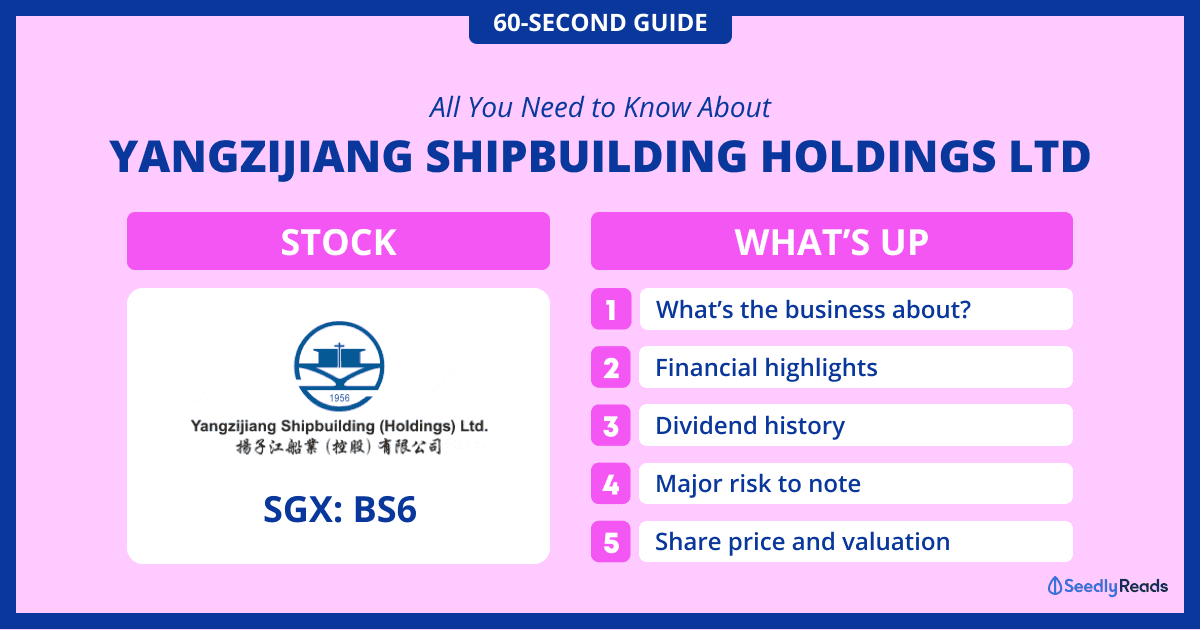Yangzijiang Shipbuilding Holdings Ltd (SGX: BS6) Share Price at S$1.43: How Is Its Business Performing?
 Sudhan P
Sudhan P●
Famed investor Peter Lynch once mentioned:
“Behind every stock is a company. Find out what it’s doing.”
What this means is that we should go beyond a company’s ticker symbol and stock price to understand what business it is involved in before investing in it.
On that note, let’s look at blue-chip stock Yangzijiang Shipbuilding Holdings Ltd (SGX: BS6) to understand more about it from an investor’s perspective.
All in just 60 seconds!
What’s Yangzijiang’s Business About?
Yangzijiang, founded in 1956, is one of the largest private shipbuilding companies in the world, with a top spot in China.
Yangzijiang has five shipyards in Jiangsu Province, China, and they are located along the Yangtze River.
Together, the yards produce a broad range of commercial vessels including large containerships, bulk carriers and liquefied natural gas (LNG) carriers, serving customers from Northern America, Europe and other parts of the world.
Yangzijiang’s Financial Highlights
Yangzijiang’s revenue comes from two business segments, namely, shipbuilding and investments.
The shipbuilding segment contributes to the bulk of Yangzijiang’s total revenue.
This business makes money from shipbuilding (which is contract-based) and the sale of completed vessels.
Here’s a look at Yangzijiang’s financial performance over the past five years:
2016 2017 2018 2019 2020
Revenue
(RMB’000)15,089,438 19,205,596 23,238,289 23,597,175 14,841,266
Net profit
(RMB’000)1,998,943 2,848,483 3,070,345 3,105,069 2,516,404
Net profit margin 13.2% 14.8% 13.2% 13.2% 17.0%
Return on equity 8.5% 12.1% 13.2% 10.4% 7.9%
From 2016 to 2020, revenue fell from RMB 15.1 billion to RMB 14.8 billion but net profit climbed from RMB 2.0 billion to RMB 2.5 billion.
With that, Yangzijiang’s net profit margin stepped up from 13.2% in 2016 to 17.0% in 2020.
Net profit margin is a profitability ratio that reveals how much net profit a company makes for every dollar of revenue it generates.
An increasing net profit margin equates to a more profitable company that has better control over its costs.
However, Yangzijiang’s return on equity, which reveals management’s ability to grow shareholders’ capital, declined from 8.5% to 7.9% during the same time frame.
In 2020, the COVID-19 pandemic caused major uncertainties for the shipping industry, affecting Yangzijiang’s overall business.
Yangzijiang’s Dividend History
Now let’s look at Yangzijiang’s dividend from 2016 to 2020.
Total dividend
(Singapore cents per share ) Dividend payout ratio
2016 4.0 37%
2017 4.5 29%
2018 5.0 32%
2019 4.5 30%
2020 4.5 34%
We can see that the shipbuilder’s dividend payout ratio has been conservative at below 40% over the years.
This means that even if Yangzijiang’s earnings were to fall, it should be able to maintain its total dividend of 4.5 Singapore cents per share.
Major Risk for Yangzijiang to Take Note Of
The commercial shipbuilding industry is highly cyclical in nature and as such, the demand for Yangzijiang’s shipbuilding services can fluctuate widely.
Also, the pricing of Yangzijiang’s vessels is sensitive to economic conditions around the world, especially in the US and China.
Therefore, any future deterioration in the global economy could hurt Yangzijiang’s business.
Yangzijiang’s Share Price and Valuation
Since 2007, Yangzijiang’s share price has risen just 10%.

At Yangzijiang’s share price of S$1.43 now, it has a price-to-earnings (P/E) ratio of 9x and a dividend yield of 3.2%.
In comparison, the Singapore stock market, as represented by the Straits Times Index, has a PE ratio of around 16x. This could signal that Yangzijiang is undervalued.
Having said that, investors have to discern whether it’s worth owning shares in a company that’s cyclical (as reflected in Yangzijiang’s long-term share price chart too).
Do You Want Free Seedly Exclusive Stock Deep Dive Reports?
We’ve released stock deep dive reports on a couple of companies. Grab hold of them at Seedly Rewards right now!
Disclaimer: The information provided by Seedly serves as an educational piece and is not intended to be personalised investment advice. Readers should always do their own due diligence and consider their financial goals before investing in any stock. The writer doesn’t own shares in any companies mentioned.
Advertisement
